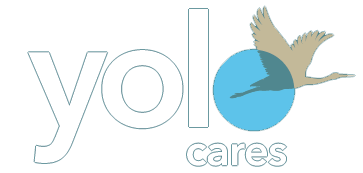
Frank is a 62-year-old man who was living at a shelter when he was first introduced to YoloCares. He had uncontrolled diabetes, high blood pressure, no primary-care physician and no established relationship with a healthcare system.
Frank’s situation is not uncommon and, unfortunately, this sort of disenfranchisement usually leads to grim health outcomes. Frank had already suffered from a challenging array of health conditions, including a toe amputation from his unmanaged diabetes.
When the YoloCares palliative care team first met Frank, they knew he would need more than just medical support in order to regain control of his health. With the help of an interdisciplinary team (including a physician, social worker, nurse, and professionally trained volunteer), Frank was able to establish himself at a permanent apartment at Fourth and Hope, a transitional housing development in Woodland. His team of healthcare navigators also helped him enroll for, and receive, CalFresh benefits, also known as food stamps.
No longer worried about housing or having food to eat, Frank could now focus on other aspects of his wellbeing. Still, with so many health concerns, Frank would need to visit multiple physicians and specialists— a daunting task for someone just returning from the brink of homelessness. But his YoloCares team quickly proved that they were up to the challenge of helping him restore both his health and his dignity.
Before Frank was referred to YoloCares as a palliative care patient, he was missing nearly all of his medical appointments. His spotty track record with healthcare providers meant that his care was unmanaged, fragmented, and not tailored to his unique challenges or needs. When his new care team realized that Frank was not checking his blood sugars before self-administering insulin, his YoloCares nurse advocated with his physician to immediately change his once injectable insulin to pill form. This simple change has made it easier for Frank to manage and effectively self-administer his own medication.
Tanya Yoo, director of palliative care, explained, “When we first asked Frank to review his medication list, he brought us three large gallon-sized plastic bags filled with prescriptions and medications.” At the time, he had no idea what was in the bags full of medication, or which ailments or conditions were to be treated with each prescription. Yoo says, “He took medications randomly and not according to any prescribed schedule.”
No one ever sat down with Frank to review and discuss his medications or to periodically check in with him to see how he was managing his prescriptions or his own health journey. As a result, Frank was not taking any of his medications as prescribed, nor did he understand what he was taking. Meanwhile, his hypertension was out of control.
Within days, his YoloCares team had collaborated with his physician to streamline his roster of medications and to develop strategies to ensure that he takes all of his required prescriptions on time. Staff have also worked closely with Frank to secure needed medical appointments, and to accompany him when he visits his primary care provider. Medications are now delivered to his home and organized by the time of day he is to take them. Both his blood pressure and his diabetes are now under control.
During a recent visit, Frank’s nurse navigator learned that he wasn’t sleeping well — a result of a worn, old mattress that he inherited from a friend. When his palliative care team learned that his insomnia was related to the lack of a proper bed, they sprang into action to find a better solution for Frank.
The unusual and dire combination of Frank’s medical and financial situation meant that he was eligible to benefit from the agency’s donor-sourced fund (called the Gwendolyn Kaltoft Asperity Fund) which supports a patient’s special needs or end-of-life wishes. This fund allowed the team to purchase a new mattress, bed frame, bedding, and pillows for Frank.
“Now that Frank’s basic needs have been met, he has time to focus on his hobbies,” according to Yoo. “He loves assembling realistic models of cars which he builds one hundred at a time before donating them to children’s wards at local hospitals.”
During another routine visit, Frank’s nurse noted that his shoes had seen better days. In fact, the toes were missing from his well-worn boots. The palliative care team again dipped into the Gwendolyn Kaltoft Asperity Fund to purchase a new pair of steel-toed boots for Frank, who was thrilled to receive the new shoes. When asked about his experience with YoloCares, Frank said, “No one has ever helped me the way your team does.”
Each year, YoloCares receives over a thousand donations, many made in memory of a recently passed loved one, all of them made by people who were touched by the services that YoloCares provides. These donations enable YoloCares to offer the types of care that Medicare or other insurances don’t reimburse for — programs that are a lifeline to those who need it most.
— Craig Dresang is the CEO of YoloCares





Leave a Reply